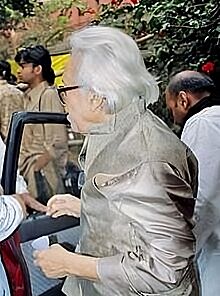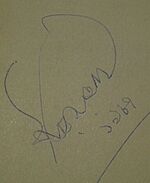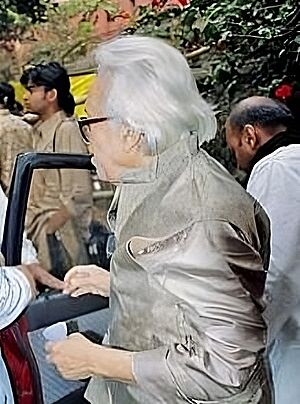Shamsur Rahman (poet) facts for kids
Quick facts for kids
Shamsur Rahman
|
|
|---|---|

Shamshur Rahman
|
|
| Native name |
শামসুর রাহমান
|
| Born | 23 October 1929 Dacca, British Bengal |
| Died | 17 August 2006 (aged 76) Dhaka, Bangladesh |
| Resting place | Banani Graveyard |
| Occupation | Poet, journalist, columnist |
| Language | Bengali |
| Nationality | Bangladeshi |
| Citizenship | Bangladeshi |
| Education | MA |
| Alma mater | Dhaka College University of Dhaka |
| Genre | Modernist |
| Notable awards | Ekushey Padak Bangla Academy Literary Award |
| Signature | |
 |
|
Shamsur Rahman (Bengali: শামসুর রাহমান; born October 23, 1929 – died August 17, 2006) was a famous poet, writer, and journalist from Bangladesh. He wrote more than sixty books of poetry. Many people consider him a very important person in Bengali literature from the late 1900s. He was even called the "unofficial poet laureate" of Bangladesh. His poems often talked about human kindness, relationships, young people's dreams, and the history of Bangladesh. He also wrote against strong religious beliefs that limit people's freedom.
Contents
Life and Education
Shamsur Rahman was born in Dhaka, which was then part of British Bengal. His family home was in a village called Paratoli, near the Meghna River. He was the third of thirteen children in his family.
He went to Pogos High School and finished in 1945. After that, he studied at Dhaka College. He started writing poems when he was about eighteen years old. He also studied English literature at the University of Dhaka. He earned his Bachelor of Arts (BA) degree in 1953. Later, he also received his Master of Arts (MA) degree.
While he was a student, he loved reading books. He once said that reading a book by Rabindranath Tagore changed him completely. In 1949, his poem Unissho Unoponchash was published in a magazine called Sonar Bangla.
Career in Journalism
Shamsur Rahman had a long career working for newspapers and magazines. He started as a co-editor at an English newspaper called Morning News in 1957. He also worked at Radio Pakistan for a short time.
After Bangladesh became independent, he wrote articles for the daily newspaper Dainik Bangla. In 1977, he became the editor of this newspaper. He also worked as an editor for Bichitra, a weekly magazine.
Even though he was a quiet person, he became a strong voice for freedom and modern ideas in the 1990s. He spoke out against religious groups that wanted to control people's lives. Because of this, some groups who disagreed with his ideas targeted him.
Poetry and Themes
Shamsur Rahman's first book of poems was called Prothom Gaan Dwityo Mrittyur Agey (First Song Before the Second Death). It was published in 1960. His poems often showed the political changes happening in Bangladesh during the 1960s and 1970s.
He wrote a famous poem called Asader Shirt about a big protest in 1969. During the Bangladesh Liberation War, he wrote many inspiring poems. These poems were so powerful that freedom fighters would read them in their camps. Later, these war poems were collected in a book called Bondi Shibir Theke (From Confinement in Enemy Territory) in 1972.
He continued to write poems that reflected the history of Bangladesh. For example, he wrote Buk Tar Bangladesher Hridoy during a protest against a leader named Hussain Muhammad Ershad. This poem honored the sacrifice of a young man named Nur Hossain.
Poetic Style
Shamsur Rahman mostly wrote his poems in a style called free verse. This means the poems don't always rhyme or have a strict rhythm. He often used a rhythm style known as Poyaar or Okhshorbritto. He also wrote poems using other Bengali rhythm styles called Matrabritto and Shwarobritto.
Attack on His Life
On January 18, 1999, some attackers tried to kill Shamsur Rahman at his home in Dhaka. His wife was also hurt during the attack. Luckily, he survived this attempt on his life. The police investigated the attack, but the people accused were later found not guilty.
Later Years and Death
Shamsur Rahman's health started to get worse in the late 1990s. He had two major heart surgeries. He passed away on August 17, 2006, at the age of 76. He died from heart and kidney problems after being in a coma for 12 days.
What People Said About His Work
Many important writers and critics praised Shamsur Rahman's poetry.
Zillur Rahman Siddiqui, a friend and critic, said that Shamsur Rahman was deeply connected to his own culture. He believed that Rahman's language spoke to people everywhere.
Professor Syed Manzoorul Islam also admired Rahman's work. He said that Rahman built on the work of earlier poets but explored new areas and added new features to poetry.
Azfar Hussain noted that Rahman's poems helped shape Bengali poetry after famous poets like Tagore and Jibanananda Das. He also said that Rahman's poetry connected with many different people and inspired them to fight against unfairness.
In 1983, the writer Humayun Azad wrote a book called Shamsur Rahman : Nisshongo Sherpa (A Lonely Climber). This book looked closely at Shamsur Rahman's poems.
Tribute
On October 23, 2018, which would have been his 89th birthday, Google Doodle honored Shamsur Rahman.
Literary Works
Poetry
- Prothom Gan Ditio Mrittur Age (1960)
- Roudro Korotite (1963)
- Biddhosto Nilima (1967)
- Niralokay Dibboroth (1968)
- Neej Bashbhumay (1970)
- Bondi Shibir Theke (1972)
- Dusshom
- Tableay Applegulo Heshe Othay (1986)
- Obirol Jolahromi (1986)
- Amra Kojon Shongi (1986)
- Jhorna Amar Angulay (1987)
- Shopnera Dukray Othay Barbar (1987)
- Khub Beshi Valo Thakte Nei (1987)
- Moncher Majhkhanay (1988)
- Buk Tar Bangladesher Hridoy (1988)
- Matal Hrittik
- Hridoy Amar Prithibir Alo (1989)
- Shay Ak Porobashay(1990)
- Grihojudder Agae(1990)
- Khondito Gourob(1992)
- Dhongsher Kinare Bashay(1992)
- Akash Ashbe Neme(1994)
- Uzar Baganay(1995)
- Asho Kokil Asho Shornochapa
- Manob Hridoy Naibeddo Shajai
- Hemonto Shondhay Kichukal(1997)
- Chayagoner Shonge Kichukkhon
- Meghlokay Monoz(1998)
- Shoundorjo Amar Ghore(1998)
- Ruper Probale Dogdho Shondha(1998)
- Tukro Kichu Shonglaper Shako(1998)
- Shopno O Dushshopnay Bachay Achi(1999)
- Nokkhotro Bajate Bajate(2000)
- Shuni Hridoyer Dhoni(2000)
- Hridopodmay Jotsna Dolay(2001)
- Bhognostupay Golaper Hashi(2002)
- Bhangachora Chand Mukh Kalo Kore Dhukchay(2003)
- Ak Phota kemon Onol(1986)
- Horiner Har(1993)
- Gontobbo Nai Ba Thakuk(2004)
- Krishnopokkhay Purnimar Dikay(2004)
- Gorostanay Kokiler Korun Aaobhan(2005)
- Andhokar Theke Aloy(2006)
- Na Bastob Na Dushshopno(2006)
Short Stories
- Shamsur Rahmaner Golpo
Novels
- Octopus(1983)
- Adbhut Adhar Ak(1985)
- Niyoti Montaz(1985)
- Elo Je Abelay(1994)
Children's Literature
- Alating Belating(1974)
- Dhan Bhanle Kuro Debo(1977)
- Golap Phote Khukir Hatay(1977)
- Rongdhonur Shako(1994)
- Lal Fulkir Chora(1995)
- Noyonar Jonno(1997)
- Amer Kuri Jamer Kuri(2004)
- Noyonar Jonno(2005)
Autobiography
- Kaaler Dhuloy Lekha
- Smritir Shohor
Collected Columns
- Akanto Bhaban
Poems in Translation
- Robert Froster Kobita(1966)
- Robert Froster Nirbachito Kobita(1968)
- Khawaja Farider Kobita(1968)
Drama in Translation
- William Shakespeare's Hamlet
- Uzein O'Neeler Markomilions
Other Works
- Uponnyash Shomogro
- Noyonar Uddeshe Golap
- Kobitar Shather Gerostali
- Gorosthane Kokiler Korun Ahban
- Nirbachito[SR] 100 Kobita
- Noyonar Jonno Ekti Golap
- Shera Shamsur Rahman
- Rongdhonur Sako
- Shamsur Rahman-er Sreshtha Kobita (1976)
- Premer Kobita (1981)
- Shamsur Rahmaner Sreshtho Kobita (from Kolkata) (1985)
- Shamsur Rahmaner Rajnaitik Kobita (1988)
- Shamsur Rahmaner Premer Kobita (1993)
- Shonirbachito Premer Kobita (1993)
- Nirbachito Chora O Kobita (1996)
- Kabbyashombhar (1996)
- Chorashomogro (1998)
- Prem O Prokitir Kobita (2004)
- Shera Shamsur Rahman (2004)
- Shamsur Rahman Kobita Shongroho (2005)
- Shamsur Rahman Goddo Shongroho (2005)
- Kobita Shomogro Ak (2005)
- Kobtia Shomogro Dui (2006)
Awards
- Adamjee Award (1962)
- Bangla Academy Literary Award (1969)
- Ekushey Padak (1977)
- Swadhinata Dibosh Award (1991)
- Mitshubishi Award of Japan (1992)
- Ananda Puroshker from India (1994).
- TLM South Asian Literature Award for the Masters, 2006.
Sample Work
One of his most famous poems was written in 1971 during the liberation war in Bangladesh.
- স্বাধীনতা তুমি
স্বাধীনতা তুমি রবি ঠাকুরের অজর কবিতা, অবিনাশী গান
স্বাধীনতা তুমি কাজী নজরুল, ঝাঁকড়া চুলের বাবরি দোলানো মহান পুরুষ
সৃষ্টি সুখের উল্লাশে কাঁপা
- Shadhinota Tumi
Shadhinota tumi Robi Ţhakurer ôjor kobita, obinashi gan
Shadhinota tumi Kazi Nozrul, jhakŗa chuler babri dolano môhan purush
srishţi-shukher ullashe kãpa ...
- Freedom, You
Freedom, you are the immortal poems and songs of Rabindranath
Freedom, you are Kazi Nazrul, the great man with waving unkempt hair,
raptured in your joy of creation ...
the phrase "srishti-sukher ullase" also refers to one of Nazrul's poems "aaj srishti sukher ullase"
- Oh Freedom
Freedom, you're
The classic verses of Tagore, timeless lyrics.
Freedom, you're
Kazi Nazrul a great man with thick mane...
See also
 In Spanish: Shamsur Rahman para niños
In Spanish: Shamsur Rahman para niños
 | James Van Der Zee |
 | Alma Thomas |
 | Ellis Wilson |
 | Margaret Taylor-Burroughs |


